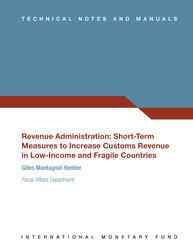
Revenue Administration
Short-Term Measures to Increase Customs Revenue in Low-Income and Fragile Countries
This note discusses administrative measures that can be implemented by customs administrations of low-income and fragile countries in a short period (about a year) to improve traders’ compliance and improve revenue collection. These suggested actions have been identified based on the experience acquired through the International Monetary Fund’s (IMF) Fiscal Affairs Department’s (FAD) technical assistance (TA), particularly the findings and recommendations of TA missions to sub-Saharan African countries. Strengthening low-capacity customs administrations requires structural reforms to support the effective implementation of defined strategies. Developing core operational functions such as risk management, audit, investigation and intelligence are good examples of such reforms. Modernizing human resource management policies or achieving a fully automated environment in a customs administration are longer-term reform projects. Long-term reforms are not addressed here. The note focuses on targeted actions with a potential to increase trade revenue in the short term, and which can be taken without mobilizing large resources or engaging in a broad reorganization. It is hoped that the suggestions in this note will help stakeholders, including country authorities, customs management, donors and TA partners, area departments of the IMF, FAD, and the IMF regional TA centers, identify, design, and implement short-term changes in customs administrations. If implemented effectively, these changes should contribute to a noticeable improvement of revenue performance.
Publication date: April 2019
ISBN: 9781498305617
$10.00
Add to Cart by clicking price of the language and format you'd like to purchase
Available Languages and Formats
| English |
Prices in red indicate formats that are not yet available but are forthcoming.
Topics covered in this book
This title contains information about the following subjects.
Click on a subject if you would like to see other titles with the same subjects.
custom administration , transaction value , custom authority , custom procedure , valuation method
Summary
Copyright © 2010 - 2026
Powered by:
AIDC



